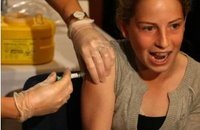Univ. of Washington students among 10,000 participating in HPV vaccine study

Seattle, WA
The UW is involved in studies regarding a new vaccine for human papillomavirus (HPV) after UW researchers played a significant role in the development of Gardasil, an existing vaccine for the sexually transmitted infection.
Constance Mao, an assistant professor of obstetrics and gynecology at the UW, is leading the study of 102 women between ages 16 and 26 at Hall Health Primary Care Center.
The study, funded by Merck & Co., Inc., which started manufacturing Gardasil in 2006, will compare the effectiveness of the new vaccine to that of Gardasil.
There will be 10,000 participants in the project worldwide.
Research sites are located around the globe to promote diversity among participants, though most sites are in South America and Asia because they are less expensive to manage.
UW researcher Laura Koutsky from the UW School of Public Health was credited for making major contributions to the development of Gardasil, beginning with trials that started in the late 1980s.
The UW research enterprise’s licensing income leapt from $12 million in 2006 to $38 million in 2008 through the collection of royalties for developing and testing the vaccine.
Mao said that Gardasil can prevent about 70 percent of all HPV strains, but it only helps prevent two types of HPV that could cause cervical cancer. The multivalent HPV vaccine currently being tested could help prevent seven types of cancer-causing HPV.
“The vaccine could be 87 to 88 percent effective at preventing … abnormal pap tests,” Mao said.
Costs of treating HPV and cervical cancer could also go down, Mao said, as the vaccine could help avoid costly diagnosis and uncomfortable treatment.
Study coordinator Sandra O’Reilly said participants for the study attend sessions lasting no longer than an hour over a period of three-and-a-half years.
The length of the study does not affect how participants are selected, said Lauren Asaba, a health care specialist at the Women’s Clinic at Hall Health.
However, Asaba does ask during screening sessions if participants could be leaving Seattle during the study period.
Participants are given the vaccine and have exams throughout the study, giving them virtually free gynecological care during the study. Participants of the study will be exposed to HPV, Mao said.
Mao will be looking for signs of cervical dysplasia in order to test the effectiveness of the vaccine.
“If a subject does have an abnormal pap [test], which is an indication of HPV infection, they are seen by Mao, and it is covered by the study,” Asaba said.
Labels: Cervical Cancer Prevention, Cervical Cancer. HPV, HPV Vaccine

0 Comments:
Post a Comment
<< Home